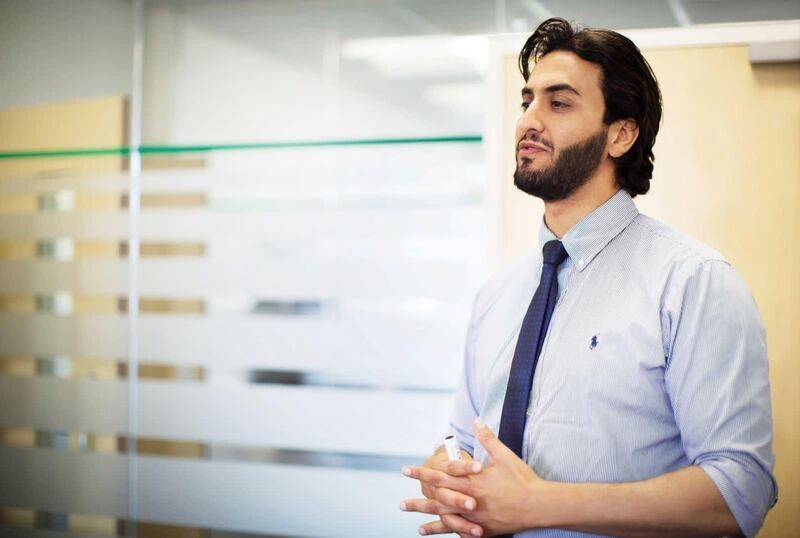It was the early 1990s, and the age of dial-up connections and modems. The Internet was in its infancy, the machine had a tiny memory and data was stored on a floppy disk, but 12-year-old Mohammed Alhusban was hooked.
For despite the basic nature of the technology, Dr Alhusban’s young self instinctively grasped the potential lurking behind the monitor of the family's gleaming new Acer AM486, with its “magical” keyboard and “wizard tool” of a mouse.
That is, when his older sister Amal, “guardian” of the microprocessor, deigned to unlock the wooden cabinet their parents had commissioned for its safekeeping at their home near the Jordanian capital Amman.
“I had to behave really nicely for the whole entire week,” he tells The National. “We used to go to school six days and only had Fridays off.
“I had to do all my homework and complete the monthly reading that my mum and dad set for me, and then I was allowed access to it to plug it in with all the excitement of a child: ‘Let’s see, what can I do with it? What can I do with it?’”
Dr Alhusban’s father Abdallah, a teacher who retrained as a lawyer, and mother Hind, a hairdresser, were educated and ambitious for their eight children, organising a reading regime and regular trips to the library.
They had, he explains, gained an understanding of the power of knowledge because the generations that came before them were illiterate.
Hence the gigantic satellite dish mast in the garden of the family home in historic Mafraq, marking them out as early adopters of technology and one of only two households in the community to own a computer.
“It was the door for me to start thinking about the human/computer interaction, which is the relationship between the machine and the human, my area of expertise,” Dr Alhusban says.
“Trying to understand how we can develop a machine-learning algorithm based on the human cognitive or emotional model … this is where the whole thing came together because I was exposed to these technologies as a child.”
Perhaps it was inevitable that Amal went on to become a professor of computer science at the University of Michigan, while the teenaged Mohammed embarked on studying the same subject at the Jordan University of Science and Technology.
These days, Dr Alhusban is a “digital transformation expert” who, according to his LinkedIn profile, builds seamless and effective integration strategies of digital and disruptive technology into all areas of a business.
Much of which is more than slightly baffling to many of us. So, to understand what he is moving towards, it helps to know more about where he comes from.
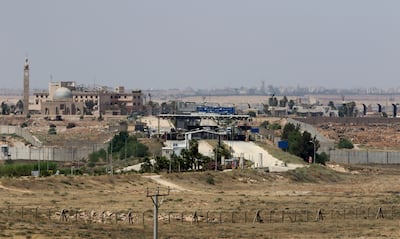
Born and raised in Jordan until 21, his heritage is Bedouin. “I'm from one of the largest tribes in Jordan, called Bani Hassan, and they usually call it the ‘Tribe of a Million’. We are all related by blood, which is really interesting growing up in a community where everybody's a cousin.”
The experience has shaped much of Dr Alhusban’s life and work. His parents still live in Mafraq, which takes its name from being a "crossroads" with Syria to the north and Iraq to the east.
Their district of Al Husban shares the family name, another illustration of the deep roots.
His grandfather, a tribal leader and later mayor, established the community in the 1950s, persuading his people to put aside their nomadic life by giving them land on which to build their own homes.
“That was my grandfather’s vision,” Dr Alhusban says. “His idea was to build a macro community within the town.”
The young Mohammed would while away hours watching the daily flow of people assemble in the garden to talk to his grandfather about what had happened during the week, what was coming and generally sharing stories.
It was, Dr Alhusban now says, the news media stream of the day operating within a social media platform in physical terms.
“As a child until a certain age, maybe 14 or 15, my brother Ahmed and I were expected to just sit and learn; you’re not supposed to be talking,” he says.
“I always refer to it as ‘an eye on the side’, where you observe, try to understand what people do, how they do it and why. That had a massive impact on my current career.
"In fact, all the ethnographical research I’ve done into usability, in user experience, in trying to understand human behaviour was completely driven by that.”
If nothing like the size of his tribe, Dr Al Husban’s immediate family is also numerous, with six sisters and a younger brother.
Large families are the norm in his community but, as he explains, the reason for the preponderance of older sisters is the result of the tradition of having a male heir.
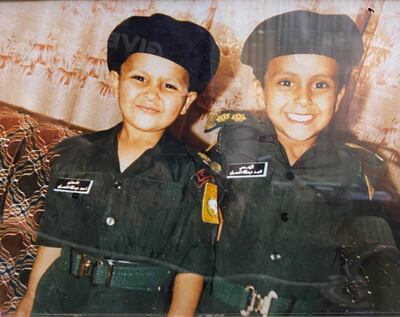
“So my parents kept trying to get that boy — and it was me,” he says. “It’s just to carry on with the legacy, having the family name.
“But it was a brilliant experience. It was the best and I will always be thankful to my parents for having a big family.
"You’ve got a fantastic support system and, thank God, we are all on good terms and have a good relationship.”
Looking back, he thinks that he inherited his creativity and enjoyment of design from his mother.
Seeming not to intend the pun, Dr Alhusban notes that she was “cutting-edge from the beginning” with the only hair salon in the region. “Which was a big deal then,” he says.
Of the siblings, five are professors or associate professors at different universities around the world.
Dr Alhusban made the life-changing decision to study for a master’s degree in the UK, where he would remain for much of the next 19 years.
The course in electronic business was at the University of Huddersfield, a former mill town in the north of England. It was the first time Dr Alhusban had travelled to Europe.
“It was really quite overwhelming,” he says. “I remember when I first landed in Huddersfield, and it’s West Yorkshire — not the same English we were taught at school.”
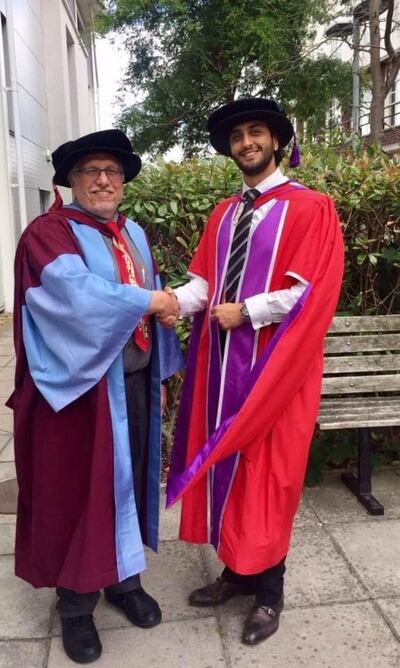
That much of the first months were spent focused on his language skills is evident in the distinct Yorkshire tinge of his English pronunciation.
He also made a conscious decision to stop speaking Arabic and mix with students with backgrounds that differed from his own.
“I lived in shared accommodation with seven Brits from different areas in the UK. It was an extremely rich experience, to find out more about British customs and the degree of tolerance Brits usually have.”
The welcoming attitude then and now means that Dr Alhusban has come to consider Britain to be home.
After finishing his masters there was a job offer in Jordan, working for a UN NGO, then a lecturing post at a university in Bahrain teaching human-computer interaction, followed by a doctorate at the University of Portsmouth.
His thesis looked at the way technology could be harnessed to help refugees.
“Mafraq, my home town, is literally next to one of the largest refugee camps in the world, Zaatari, which is home to more than 100,000 refugees from Syria,” Dr Alhusban says.
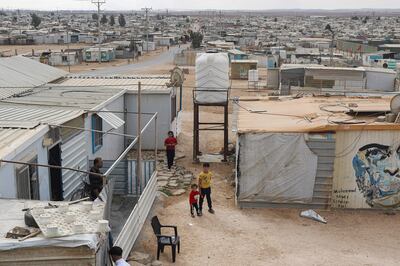
“In essence, my PhD is all about how we can utilise digital government services to facilitate the transition from a camp to a city, because eventually it’s going to happen. They evolve over time to become towns and cities.”
The formula is complex but involves collecting large amounts of data on the ground that measures physical needs — housing, health, employment — but also the emotional vicissitudes.
“It's not just the infrastructure that needs to move from a camp to a city, but people's mindset and perception towards living there also needs to change," he says.
"So the research was really enriched with insight from refugees’ behaviour, feelings and emotions, and what they go through.”
It is a complex process underpinned by the idea that technology can enrich our lives rather than complicate it.
In a different setting, the technique applied to his next job as a lecturer at Solent University in Southampton, where he created a model for the institution’s so-called usability lab.
“Usability is one of those qualities that you need to understand how users interact with the machine,” Dr Alhusban explains. “Whether they know how to use it, or they don't know how to use it now.
“Some of the objects we use on a daily basis, like a pen, are designed with the utmost usability because without thinking twice you know how to use it.
"That’s the same with a fork. Everybody knows how to use a fork, but with mobile apps, digital products, websites, any other sort of technologies, that’s not necessarily the case.”
There are obvious commercial advantages for companies testing whether their products are fit for purpose before going to market. But if usability is relatively easy to define and gauge, how much harder to quantify contentment?
That was Dr Alhusban’s goal in his 2018 project for the Dubai and UK company SmartCitti where his title was and still is “Architect of Happiness”.
He certainly appears to have found happiness. At 41, he has two daughters, Diana, 12, and Raya, 1, and he has just celebrated his fifth wedding anniversary to his second wife, Lina Saleh, a Jordanian teacher.
The work-life balance is important, he says. “I run a lot. I swim a lot. I’m a gym person. I need to go on a daily basis.”
He is also passionate about sailing, after learning in the south of France, and has dreams one day of owning a lake-view house with a small mooring.
But the emotion seems so personal and complex that it is surely impossible to define, particularly for an entire city or community. Dr Alhusban insists, however, that it can be measured in a useful way.
Precisely when an individual is experiencing positive emotions can be determined by the collection of large amounts of data, including from social media.
The method involves virtual and augmented reality as well as geospatial awareness, which is the relationship between places and people.
The practical, commercial applications of such a predictive model are illustrated by the launch in four southern US states of a home and motor insurance company that constantly calculates premiums in real time based on customers’ reported levels of happiness.
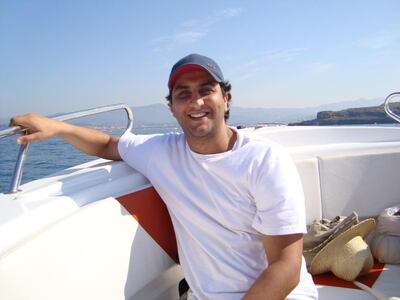
Insurance companies are not noted for their benevolence but, as Dr Alhusban points out, “conflict between family members is the number one reason for car accidents”.
Apparently, those who are happy pay no premium at all. So the logic is: drive angry, pay more for insurance.
He still has work in Dubai for du, the telecoms company, providing customer insight for a digital transformation project, and is impressed by the vision of the emirate.
“They are genuinely open to new and radical ideas in terms of the way we do research, how we identify customer needs and bring in new ideas, especially within the context of immersive experiences.
“As in, ‘Let's jump into the metaverse, let's do something in an immersive way, let's think about something different, let's provide new services, let's think outside the box'.”
At the suggestion that the constant pursuit of positive emotions could actually make us miserable, and the surrender of volumes of personal data might be misused by government or corporations, Dr Alhusban is untroubled.
“We are doing it for an open, happy society,” he says, “and really to try to improve people's lifestyles.”
